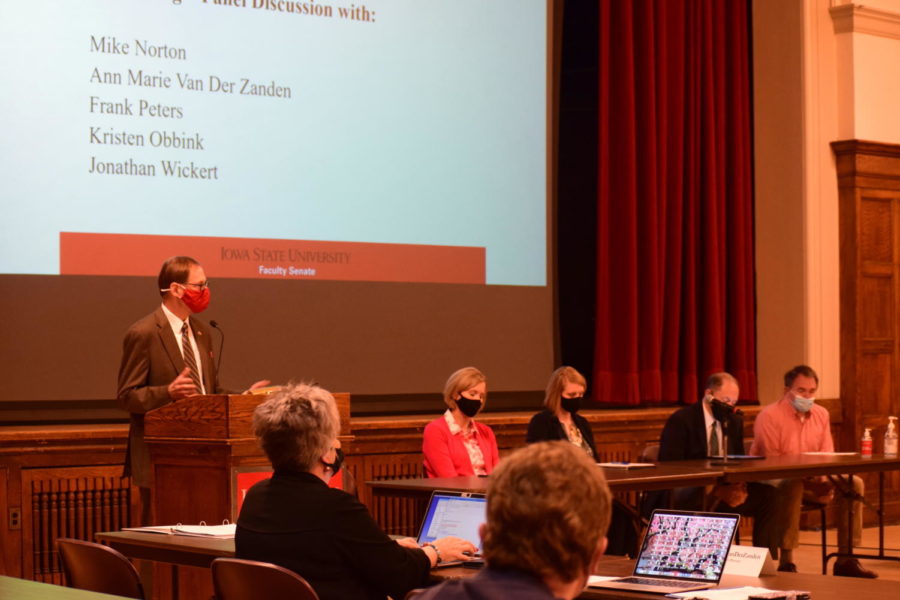Iowa State Faculty Senate questions university administration on COVID policies and HF802
Senior Provost Jonathan Wickert discussing COVID-19 mitigations during the Sept. 14 Faculty Senate meeting.
September 14, 2021
Editor’s note: A previous version of this article stated Peterson said there is are “moral issues”. The corrected statement now reads “morale issues”. The Daily regret this error.
Iowa State administration heard frustrations from Faculty Senate about the university’s management of COVID-19 campus mitigations during their meeting Tuesday.
Based on the Board of Regents governing authority, university leadership addressed the limited scope Iowa State can take on COVID-19 mitigations during the Faculty Senate meeting Tuesday.
Many faculty members have reported feeling betrayed by the university for putting them at risk in light of the COVID-19 pandemic this fall semester. Senior Provost Jonathan Wickert said the administration hears these concerns, but there is also a spectrum of beliefs on mitigation policies the university should enact.
During the meeting, the Senate offered questions to the administration with regard to policies the university should undertake. One question sent over email and presented by the president was whether or not the Food and Drug Administration (FDA) approval of the Pfizer vaccine or the District Court ruling blocking the mask mandate ban would result in the university pursuing vaccinations and masking more aggressively.
University Counsel attorney Michael Norton said while the FDA approval is a motivating factor, the state law currently in place isn’t based on full FDA approval, therefore, won’t result in any changes with respect to a vaccine mandate.
The recent District Court ruling only applies to K-12 public schools. Norton said the ruling doesn’t change anything as of now because the University receives direction from the Board of Regents, which has ruled against mask mandates.
“Who knows the political winds may change on that issue because of this case which may have some impact on us,” Norton said. “But again it wouldn’t be from that legal agreement because the Board of Regents is who has set that mandate for us not state law.”
Norton also made clear the university is unable to sue the Board of Regents because they are technically the same legal entity. The Iowa Universities are also unable to sue the state. Any inner agency dispute among the state has to go through mediation before the attorney general’s office, and the university would need permission from the Board of Regents to do so, followed by the attorney general agreeing to take the dispute.
“As you know the president of our university serves at the will of the Board of Regents and the Board of Regents chair serves at the will of the governor, so all of those things factor into why it is not a viable option for us to take legal action on either mandating mask or mandating vaccinations,” Norton said.
Iowa State recently released a survey reporting 72 percent of in-state students said they are vaccinated. Norton said that is encouraging because Iowa State’s rates are similar to other institutions which require vaccinations.
Within Ivy League schools, every institution has implemented a vaccine mandate; all universities that offer vaccination data exceed 90 percent on-campus vaccination rates, according to Forbes. As for leaders in public universities, the University of Michigan, University of Virginia and the University of California, Berkeley all reported student vaccination rates above 90 percent. Neighbors to Iowa, the University of Minnesota has a student vaccination rate of 98.5 percent as of Sept. 2.
The Iowa State survey did not gauge the vaccination status of out-of-state students, but Norton said there is no evidence to suggest those rates are any different from in-state students.
Lucken Professor for the political science department David Peterson pointed out prior to COVID; contact tracing was a method to prevent transmission of communicable diseases.
“I don’t understand our decision to rescind pre-pandemic policy for dealing with communicable diseases to now actively do less than we would have done prior to the pandemic,” Peterson said.
Lead Public Health Vet. for the Center for Food and Security/Public Health, Kristen Obbink, served as an epidemiologist before working at Iowa State. Obbink said those policies are implemented to keep other communicable diseases at zero, but based on CDC guidance, the response has shifted from identifying, containing and eliminating the virus.
“Part of that is due to the fact that we know with COVID-19 we aren’t going to get to zero,” Obbink said. “That certainly doesn’t mean we don’t want to prevent spread but we know at this point we aren’t going to get to zero so that identify contain and eliminate it is not where we are at anymore.”
Because the state has also moved away from contact tracing, Iowa State does not receive adequate data to effectively perform contact tracing.
The Faculty Senate also addressed how to operate course curriculum and university training after Gov. Kim Reynolds signed HF802. HF802 is a bill similar to the divisive concepts executive order signed under the Trump administration. The bill bars a list of defined concepts from mandatory training and course curriculum.
Some of the prohibited concepts include the idea that merit is a racist or sexist system and individuals by virtue of race or sex bear responsibility for actions committed in the past.
Wickert and Norton gave a presentation to reduce the risk of violations of HF802. Wickert said the vast majority of academic courses and training are outside the realm of risk. For those courses that walk the line on HF802, Norton said content germane to the course or training is the university’s strongest defense.
The administration reported there have already been complaints from a few parents and students about potential infringements on HF802. The few complaints have not come in any form of litigation but instead screenshots of instructors’ powerpoints or course material which is then posted online. Wickert said this can escalate quickly and can result in teachers being trolled.
Faculty members questioned whether or not the university would defend instructors who are confronted with a violation of HF802 and Wickert said it depends on the details of the situation.
“If the interpretation of the university is we violated the law the faculty handbook says we can be fired with tenure,” Peterson said. “So a lot of our colleagues are deeply afraid not of our students, maybe they are afraid of those website but now we are afraid of administration and that is really a problem for morale issues.”







